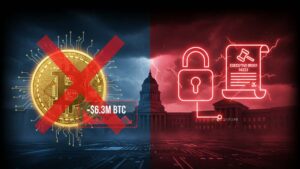TL;DR
- A U.S. court sentenced Samourai Wallet CTO William Lonergan Hill to four years in prison for operating crypto privacy tools prosecutors classified as unlicensed money-transmitting services.
- CEO Keonne Rodriguez received a five-year sentence tied to the same platform.
- The ruling shows a growing regulatory push targeting developers of non-custodial privacy technology used for Bitcoin mixing, which authorities claim supports laundering activities.
Samourai Wallet’s CTO, William Lonergan Hill, has been sentenced to four years in U.S. federal prison. Prosecutors argued that Samourai’s privacy software enabled users to hide transactions linked to criminal proceeds. The verdict intensifies a debate over whether blockchain privacy tools are legitimate protections or financial services requiring licenses.
Court Expands Crypto Mixing Probe Into Non-Custodial Tools
Hill was found guilty for his part in operating Whirlpool and Ricochet, open-source tools designed to obscure Bitcoin transaction paths. Authorities claim the software handled more than $2 billion in transfers, with at least $237 million tied to illicit activity. Although Samourai never controlled user assets, the U.S. government described it as a business enabling disguised transfers.
Defense lawyers argued that prosecutors ignored FinCEN guidance suggesting that non-custodial wallets are not money transmitters. Digital rights advocates warn that the decision targets the development of privacy software instead of criminal users. The case raises concerns regarding future prosecution of open-source developers in crypto. Some attorneys even argue that criminalizing code sets a dangerous precedent, potentially discouraging security innovation and driving privacy technology toward underground or offshore development.

Crypto Mixing Probe Intensifies Amid Privacy Debate
The Samourai ruling follows other enforcement actions against privacy technologies, including the investigation of Tornado Cash contributor Alexey Pertsev in Europe. Regulators continue monitoring zero-knowledge networks and blockchain privacy protocols. Supporters say mixing resembles encryption, protecting users from financial surveillance and corporate tracking on public ledgers.
They argue that restricting these tools is similar to banning VPNs because some criminals use them. Researchers say privacy is a core part of decentralization and warn that heavy regulation could push developers toward offshore jurisdictions rather than creating safer environments. Advocates maintain that transparency without privacy exposes users to mining monopoly risks, targeted attacks, and large-scale data exploitation by analytics firms.
Hill’s sentence strengthens U.S. scrutiny of crypto privacy tools. Authorities highlight illicit finance risks, while critics argue the ruling threatens open-source innovation. The outcome is expected to influence ongoing debates over how blockchain privacy should be regulated in the United States.










